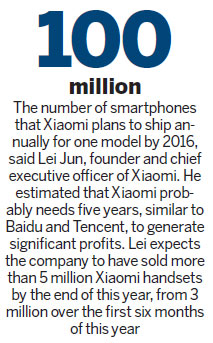
Chinese firms see robust growth in world's biggest smartphone market
China has emerged as the world's biggest smartphone market, attracting mobile phone vendors from around the globe. The country is also the world's biggest mobile phone manufacturing base, with several domestic companies such as Lenovo, Huawei and ZTE rising quickly and threatening the position of more established cellphone makers.
Tougher competition
The Chinese smartphone market is changing rapidly and is fiercely competitive. Some international brands that have performed extremely well in developed countries have not achieved similar results in the Chinese market, Apple Inc being one such case.
|
 China is now the world's biggest battleground for Chinese and overseas smartphone producers. Mobile communications is a sector that the most IT companies want to get themselves involved in for future business survival. [Photo/China Daily] |
Although Apple swept the North American and European markets as the leading smartphone brand, the company ranked seventh by market share in China during the first six months of this year, behind Samsung Electronics Co and many domestic mobile phone manufacturers.
Apple had shipped 5.2 million smartphones to China as of June, according to a report issued by information and analysis provider IHS. This accounted for a 7.5 percent share of the total smartphone market in China, and was only about one-third of the share held by market leader Samsung.
However, the figure does not mean many Chinese people dislike Apple devices. On Aug 10, nine people were put on trial in Central China's Hunan province on charges of illegal organ trade. A 17-year-old high school student voluntarily sold one of his kidneys for 22,000 yuan ($3,480) so he could buy an iPhone and an iPad.
From smuggling to selling kidneys, many Chinese are determined to get an iPhone by hook or by crook.
Apple has once again excluded the Chinese mainland from the list of first regions to roll out its latest product, the iPhone 5.
Apple pledged to open more brick-and-mortar stores in China years ago, targeting second-tier cities. However the number of Apple stores remains at five on the mainland: three in Shanghai and two in Beijing. The number is less than that of one state in the United States.
Besides having what some critics describe as an arrogant attitude, analysts explained other reasons for Apple's comparative lack of success in China. "Apple failed to make any noticeable achievement in the Chinese market because of its high pricing, simple product line and the company's reluctance to cooperate with China Mobile Ltd, the nation's biggest mobile carrier," said Kevin Wang, director of China electronics research at IHS.
|
 |
"For Apple, this is a huge disadvantage," Wang said.
TD-SCDMA technology, the 3G wireless standard adopted by China Mobile, represents the fastest-growing standard for smartphones in China. Shipments of TD-SCDMA-compliant phones are expected to rise 10-fold from 2011 to 2016, he added.
Nokia Corp of Finland, another big-name international player, experienced a rough time in the Chinese market as it shifted its focus to the Windows Phone platform. The company's ranking slipped to fifth place in China, with a 9.1 percent share in the first half. Its decline has been dramatic, having been the top smartphone brand in China during the fourth quarter of 2011, the IHS report showed.
Other international brands, such as Motorola, Sony and LG Electronics, all delivered unsatisfactory results, gaining less than 5 percent in market share in China in the first six months of this year.
In contrast with foreign companies' weak performances, some Chinese manufacturers have experienced robust growth and grabbed significant market share.
Lenovo Group Ltd, the largest Chinese PC maker by market share and second-largest globally, is now the second largest smartphone provider in China based on sales in the first half of 2012.